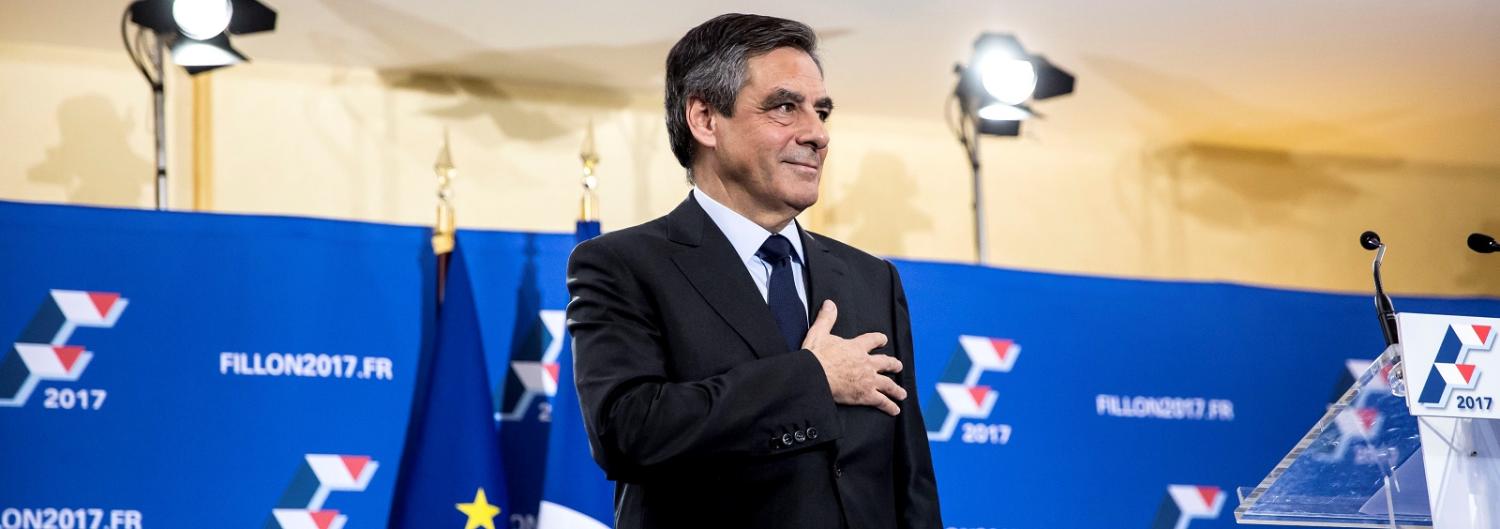Presidential hopeful François Fillon has pledged to make France a leading power again and overhaul the country's foreign policy. But both those promises could struggle when they meet with realpolitik.
The former Prime Minister won last November's republican primaries and is the favourite to win the presidential election in April.
Fillon's agenda is ambitious. He intends to implement Thatcher-like reforms and restore France to its former economic prowess. And he plans to repositioning the country internationally – by seeking close alliances with Russia and Syria. But his promises are likely to soon run into obstacles, both at home and abroad.
The Republican candidate says he will slash public sector jobs by half a million, put an end to the 35-hour-week and increase the retirement age. He has promised to implement these radical proposals within 100 days of being elected.
All of this is music to the ears of conservative voters who despair of the ailing French economy. Growth has stalled at just 1% per annum and unemployment has been higher than 10% for years. Many blame the country's inflexible labour laws, high taxes, and a generous social welfare system that France can no longer afford.
Fillon's promises are good politics. He has 'managed to establish himself as an austere, trustworthy candidate who is not hiding the truth from French voters and will do what's needed to get the economy back on track,' observed Bruno Cautrès, researcher at the Centre for Political Research at Sciences Po (Cevipof).
But can the 62-year-old candidate succeed when so many before him have failed? France's economy is notoriously difficult to reform. Just take this year's labour law changes. A draft law - that was far from being a major overhaul of labour regulation - triggered months of country-wide protests. The government could only push through a considerably watered down version, and that required the use of an emergency procedure to override the opposition.
What's more, Fillon has announced he will use referenda to push through his reforms. This would 'bring back together the now-fragmented left and unite them in a struggle against the destruction of their beloved social model', Cautrès warns. A nationwide wave of protests would result.
Fillon's resounding strength also reflects his championing of traditional catholic values. Some 35% of the French trust Fillon to defend traditional French values according to a recent poll, more than trust Marine Le Pen, the leader of the far-right party National Front who is likely to face Fillon in the election runoff.
Fillon claims he will restore the state's authority, bring down immigration and crack down on potential terrorists. He is against gay adoption and depicts Islam as a hostile influence in his recently published book.
Fillon has been pleading for stronger links especially with one country on this global conservative axis: Russia. He first had a close working relationship with President Vladimir Putin when they met as Prime Ministers between 2008 and 2012. Fillon says EU sanctions against Russia should be dropped as they are detrimental to French companies. And he believes the West is partly to blame for its deteriorating relationship with Russia.
'I think [the West] made huge errors in dealing with Russia after the Soviet Union’s collapse,' Fillon told journalists at the European-American press club in Paris in July. Having behaved in an 'irresponsible' manner toward Moscow, the West now had to 'find a way to speak to Russia,' Fillon said.
But strengthening ties with Putin could have wide-ranging consequences – for France and the European Union. Opposing sanctions against Russia would undermine the Franco-German power combination, says Jean-Sylvestre Mongrenier from the Paris-based Institute for Geopolitics. 'And that bilateral entente is crucial to holding the EU together – especially now, as we have finally found a fragile balance after the European debt crisis', he stated. Mongrenier believe a Franco-German break-up could eventually lead to the collapse of the European Union.
That's why much of Fillon's talk in favour of a rapprochement with Russia could be just rhetoric, according to Karim Bitar, Senior Fellow at the Paris-based Institute for International and Strategic Affairs. Bitar notes Fillon has not declared he wants to break up the EU, rather he wants to reform its institutions and have them refocus on core areas. Destroying the EU would go against Fillon's aim to make France a great power again, Bitar says. 'France needs the EU as a lever for its own influence. It's difficult to see how the relatively small country France could weigh as a soft power outside a big alliance of states.'
Fillon's endorsement of Bashar Al-Assad also faces a reality check. The candidate is pleading in favour of an alliance with the Syrian President. For Fillon, it's a choice between Assad and chaos, between a legitimate regime and terrorism. But that isn't a tale a grande nation should be telling, says Mongrenier. 'Fillon is accepting a false version of reality put forward by Assad. France doesn't have much leverage on the ground, but it does have an obligation to set a good example. After all, we are the country of human rights.'
Many would agree that if France wants to be seen as a grande nation, it has to defend those rights. At least symbolically.
